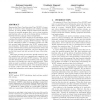Free Online Productivity Tools
i2Speak
i2Symbol
i2OCR
iTex2Img
iWeb2Print
iWeb2Shot
i2Type
iPdf2Split
iPdf2Merge
i2Bopomofo
i2Arabic
i2Style
i2Image
i2PDF
iLatex2Rtf
Sci2ools
125
click to vote
CASES
2003
ACM
2003
ACM
Clustered calculation of worst-case execution times
Knowing the Worst-Case Execution Time (WCET) of a program is necessary when designing and verifying real-time systems. A correct WCET analysis method must take into account the possible program flow, such as loop iterations and function calls, as well as the timing effects of different hardware features, such as caches and pipelines. A critical part of WCET analysis is the calculation, which combines flow information and hardware timing information in order to calculate a program WCET estimate. The type of flow information which a calculation method can take into account highly determines the WCET estimate precision obtainable. Traditionally, we have had a choice between precise methods that perform global calculations with a risk of high computational complexity, and local methods that are fast but cannot take into account all types of flow information. This paper presents an innovative hybrid method to handle complex flows with low computational complexity, but still generate...
Related Content
| Added | 05 Jul 2010 |
| Updated | 05 Jul 2010 |
| Type | Conference |
| Year | 2003 |
| Where | CASES |
| Authors | Andreas Ermedahl, Friedhelm Stappert, Jakob Engblom |
Comments (0)

